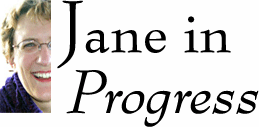 |
|
 |
 |
Looking for tips and tricks to the art of writing for television? Welcome to the blog of experienced television writer Jane Espenson. Check it out regularly to learn about spec scripts, writing dos and don'ts, and what Jane had for lunch! (RSS:  ) |
|
|
Home » Archives » April 2008 » Character Moments on the Run
[Previous entry: "Addendum to Yesterday's Post:"] [Next entry: "But Go Crazy with the "Frak"s!"]
04/11/2008: Character Moments on the Run
Someone reminded me, yesterday, of this moment from "The African Queen." My recollection was that there was a moment in which, even in a tense situation, Katharine Hepburn's character was charmingly concerned about having possibly used the wrong word. Just now I looked up the relevant exchange.
They're talking about repairing a broken boat part -- about how to reattach it after it's fixed.
ALLNUT
(ironically)
And tie it on, I suppose.
ROSE
(missing his irony)
Yes, if you think that will do. But
wouldn't it be better to -- weld it?
That's the right word, isn't it?
Weld it on?
ALLNUT
You're a one, Rosie. Really you are.
(laughs)
ROSE
Isn't weld the right word, dear? You
know what I mean even if it isn't,
don't you?
ALLNUT
Oh, it's the right word, all right.
He laughs again. At first, Rose is afraid that his laugh is
caused by desperation, but when she sees that it is not, she
laughs with him.
This is an amazing example of sneaking character moments into plot moments. This is my favorite kind of writing in the world. They're focused on finding a solution to their problem. Really, really focused, and yet look at all the character stuff -- first, it says something about her that she misses the irony, and then there's more character because she's embarrassed about having possibly used the wrong word, and EVEN MORE about her that she thinks the two of them can attempt a solution on such a large scale. On his side, we get to see, first, his ironic inclination, and then his reaction to all those quirks of hers that I just mentioned. My god, this is dense. (Also note the wonderfully specific stage direction at the end. Perfect.)
Analyzing it that way makes it look impossible to write, I know. But it's not. Just always think, even when you've got characters frantically pushing through the moves of your story... always think about what they're really thinking and feeling, especially about the other characters in the scene, and let them express it in some little way. Are they nervous or confident? Who feels subservient to whom? Is someone playing dumb, being coy, or trying to impress? If you let those considerations come out in how they talk, you're going to end up with lovely dense character-rich exchanges even when the plot is galloping along.
Lunch: chicken quesadilla
|
|
|
 |
|
Get Blog Updates Via Email
|
|
 |

